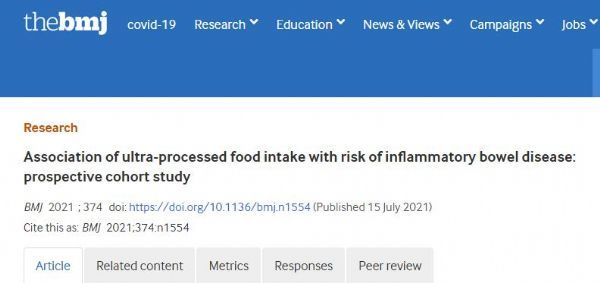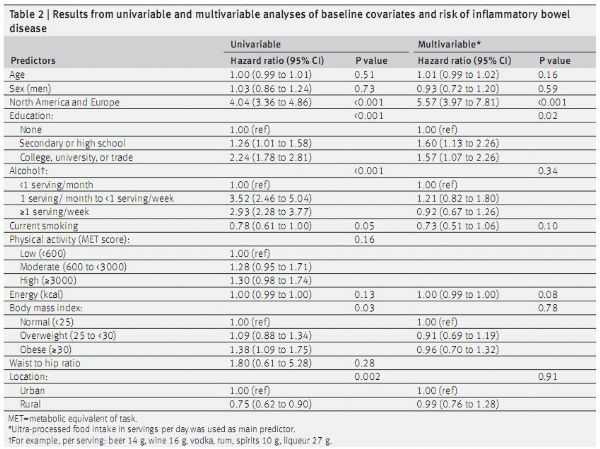Processed foods may be directly related to inflammatory bowel disease
- Normal Liver Cells Found to Promote Cancer Metastasis to the Liver
- Nearly 80% Complete Remission: Breakthrough in ADC Anti-Tumor Treatment
- Vaccination Against Common Diseases May Prevent Dementia!
- New Alzheimer’s Disease (AD) Diagnosis and Staging Criteria
- Breakthrough in Alzheimer’s Disease: New Nasal Spray Halts Cognitive Decline by Targeting Toxic Protein
- Can the Tap Water at the Paris Olympics be Drunk Directly?
BMJ: Large intake of super processed foods may be directly related to the increased risk of inflammatory bowel disease in the body
Processed foods may be directly related to inflammatory bowel disease. Inflammatory bowel disease (IBD) is a chronic inflammatory disease of the body’s gastrointestinal tract, which includes Crohn’s disease and ulcerative colitis.
The pathophysiological characteristics of inflammatory bowel disease are believed to be related to the activation of the immune system of the intestinal mucosa , Which will respond to the imbalance of the gastrointestinal flora of the genetically susceptible population. Diet will change the body’s microbiome and modify the intestinal immune response, thus playing a key role in the pathogenesis of inflammatory bowel disease.
Recently, in a research report titled “Association of ultra-processed food intake with risk of inflammatory bowel disease: prospective cohort study” published in the international journal BMJ, scientists from McMaster University and other institutions found through research , A large amount of super-processed food may be directly related to the occurrence of high-risk inflammatory bowel disease.

Image source: https://www.bmj.com/content/374/bmj.n1554
Super processed foods include packaged baked goods and snacks, sparkling drinks, sugary cereals, ready-to-eat foods with additives, reconstituted meat and fish products, which usually contain high levels of added sugar, fat, and salt , But lacks microorganisms and cellulose. Inflammatory bowel disease is very common in people in industrialized countries. Scientists often believe that dietary factors play an important role in it. However, data linking super-processed foods to the risk of inflammatory bowel disease is very limited. To this end, in this article, the researchers studied 116,087 adults aged 35-70 in 21 low-, middle- and high-income countries, analyzed their dietary information in detail, and incorporated it into In the prospective urban and rural epidemiological survey plan (PURE Study), the study analyzed the impact of social influencing factors from different countries around the world on the population’s chronic diseases.
Participants joined the study from 2003 to 2016, and they were evaluated every three years. During an average follow-up of 9.7 years, the researchers recorded participants who were diagnosed with inflammatory bowel disease. During the study period, a total of 467 participants developed inflammatory bowel disease, including 90 Crohn’s disease patients and 377 ulcerative colitis patients. After considering other additional influencing factors, the researchers found that large intake of super processed foods may be directly related to the participants’ increased risk of inflammatory bowel disease. For example, compared to consuming less than one serving of super processed food a day, participants who consumed 5 or more super processed foods a day had an 82% increase in the risk of inflammatory bowel disease. Participants who processed food had a 67% increase in risk.
Researchers also found that different types of super processed foods may all be associated with an increased risk of inflammatory bowel disease. In contrast, white meat, red meat, dairy products, starches, fruits, vegetables, and grains did not seem to be associated with participants’ inflammatory bowel disease. For Crohn’s disease and ulcerative colitis, the results obtained are consistent. After further analysis, the researchers wanted to detect the risk of inflammatory bowel disease based on the age and region of the participants, and the results obtained were also Similar, this shows that the results of this paper are reliable.

Univariate and multivariate analysis results of baseline covariates and inflammatory bowel disease risk.
Image source: Neeraj Narula, et al. BMJ (2021) doi: 10.1136/bmj.n1554
The researcher pointed out that this is an observational study, so it cannot establish a causal relationship between the two. More importantly, the relevant research results rely on self-reported diagnosis and do not take into account participants over time. Changes in diet; and researchers cannot rule out the existence of other unmeasured confounding factors that may affect the results. Nevertheless, the findings in this article still support the hypothesis that the intake of super-processed foods may be an environmental factor that increases the body’s risk of inflammatory bowel disease. The researchers explained that since no associations have been found between white meat, unprocessed red meat, starches, vegetables, fruits, and grains and the occurrence of inflammatory bowel disease, the results of this study indicate that the food itself may not give the risk of this disease. , But the way food is processed or super-processed.
In summary, the results of this article show that large intake of super-processed foods may increase the risk of inflammatory bowel disease; later researchers still need further research to determine whether processed foods can explain the observed super-processed foods and inflammation. Special potential contributors to the association between bowel disease risk.
(source:internet, reference only)
Disclaimer of medicaltrend.org
Important Note: The information provided is for informational purposes only and should not be considered as medical advice.



